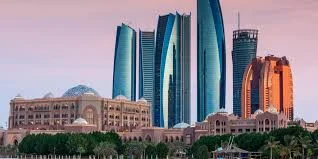Barings Expands in the Middle East: A Game-Changer for Regional Asset Management?
In a move signaling growing confidence in the Middle East’s financial markets, global investment management firm Barings has announced plans to open an office in Abu Dhabi, just months after establishing operations in Dubai. The expansion marks a strategic push into one of the world’s fastest-growing asset management hubs, positioning Barings to tap into the region’s vast capital pools and increasing demand for sophisticated investment solutions.
The decision to strengthen its presence in the Gulf Cooperation Council (GCC) region underscores a broader trend: international asset managers are setting their sights on the Middle East, drawn by sovereign wealth funds, high-net-worth investors, and a rapidly maturing financial sector. But what does Barings’ move mean for the industry, and how will it shape the future of regional asset management?
Why the Middle East? A Market Ripe for Growth
The Middle East, particularly the UAE and Saudi Arabia, has been making strides to diversify its economies away from oil dependence, with a strong focus on financial services, technology, and sustainable investments. Abu Dhabi’s ADGM (Abu Dhabi Global Market) and Dubai’s DIFC (Dubai International Financial Centre) have emerged as key financial hubs, attracting top-tier asset managers and institutional investors.
Barings, which manages over $350 billion in assets globally, is looking to capitalize on several factors that make the Middle East an attractive destination:
Growing Sovereign Wealth Funds (SWFs): The UAE’s Abu Dhabi Investment Authority (ADIA) and Saudi Arabia’s Public Investment Fund (PIF) collectively manage over $2 trillion in assets, making them some of the most influential investors globally.
Demand for Alternative Investments: Regional investors are increasingly looking at private equity, infrastructure, and sustainable investments beyond traditional asset classes.
Financial Market Reforms: The UAE and Saudi Arabia have implemented regulatory reforms that encourage foreign investment and provide more flexibility for asset managers.
“We see immense opportunity in the Middle East, particularly in private credit, infrastructure financing, and sustainable investments,” said Mike Freno, CEO of Barings. “Our expansion into Abu Dhabi reinforces our commitment to serving regional investors with tailored solutions that align with their long-term strategies.”
The Abu Dhabi Factor: Why ADGM?
Barings’ decision to establish its second Middle Eastern office in Abu Dhabi rather than another global hub signals the growing importance of ADGM as a financial powerhouse. The free zone offers 100% foreign ownership, a regulatory framework aligned with international standards, and access to a robust network of institutional investors.
ADGM has actively positioned itself as a hub for private markets and alternative investments, sectors where Barings has deep expertise. The firm’s presence in Abu Dhabi will allow it to work more closely with sovereign investors, pension funds, and family offices looking for customized asset management solutions.
“Abu Dhabi is not just a market for wealth preservation—it’s becoming a hub for capital deployment,” said a senior investment strategist at a UAE-based private equity firm. “Barings’ expansion signals that global asset managers see long-term growth potential in the region.”
Impact on the Regional Asset Management Landscape
Barings’ entry into Abu Dhabi is expected to have several ripple effects across the asset management industry in the Middle East:
Increased Competition for Talent: The firm’s arrival will intensify competition for skilled investment professionals, particularly in alternative asset classes like private credit and real estate investments.
Broader Investment Options for Local Institutions: With Barings offering a diverse range of fixed income, private equity, and sustainable investment products, regional investors will gain greater access to global markets.
Strengthening of ADGM’s Global Position: The move reinforces Abu Dhabi’s ambition to become a leading financial hub on par with London, New York, and Hong Kong.
Moreover, the expansion aligns with a growing trend: international investment firms are making the Middle East a priority market, with competitors such as BlackRock, Goldman Sachs, and Franklin Templeton already strengthening their foothold in the region.
What’s Next? A Shift in Regional Investment Trends
The Middle East’s financial sector is at a pivotal moment. As Barings and other global firms establish deeper roots, the region’s investment landscape is expected to shift in three key ways:
1. Rise of ESG and Sustainable Investments – With initiatives like the UAE’s Net Zero by 2050 strategy, there is a growing demand for sustainable investment products, an area where Barings has expertise.
2. Growth of Private Credit and Debt Markets – Institutional investors are increasingly looking for private credit opportunities, a segment that is still developing in the Middle East.
3. Tech and AI-Driven Asset Management – The adoption of fintech and AI-driven investment strategies will reshape how wealth is managed, and global firms like Barings will bring advanced technology into the region’s asset management sector.
Barings’ expansion into Abu Dhabi is more than just another office opening—it’s a strategic shift that reflects the Middle East’s growing role in global finance. With a combination of strong capital inflows, regulatory advancements, and a maturing investor base, the region is set to become a crucial player in international asset management.
For investors in the UAE and beyond, the presence of leading firms like Barings offers greater access to diversified portfolios, innovative investment strategies, and global market exposure. And for the region itself, this move solidifies its position as a financial hub that attracts the world’s best asset managers.
As the Middle East’s financial sector continues to evolve, one thing is clear: global investors are paying attention, and Barings is just the latest in a growing list of firms ready to make their mark.





